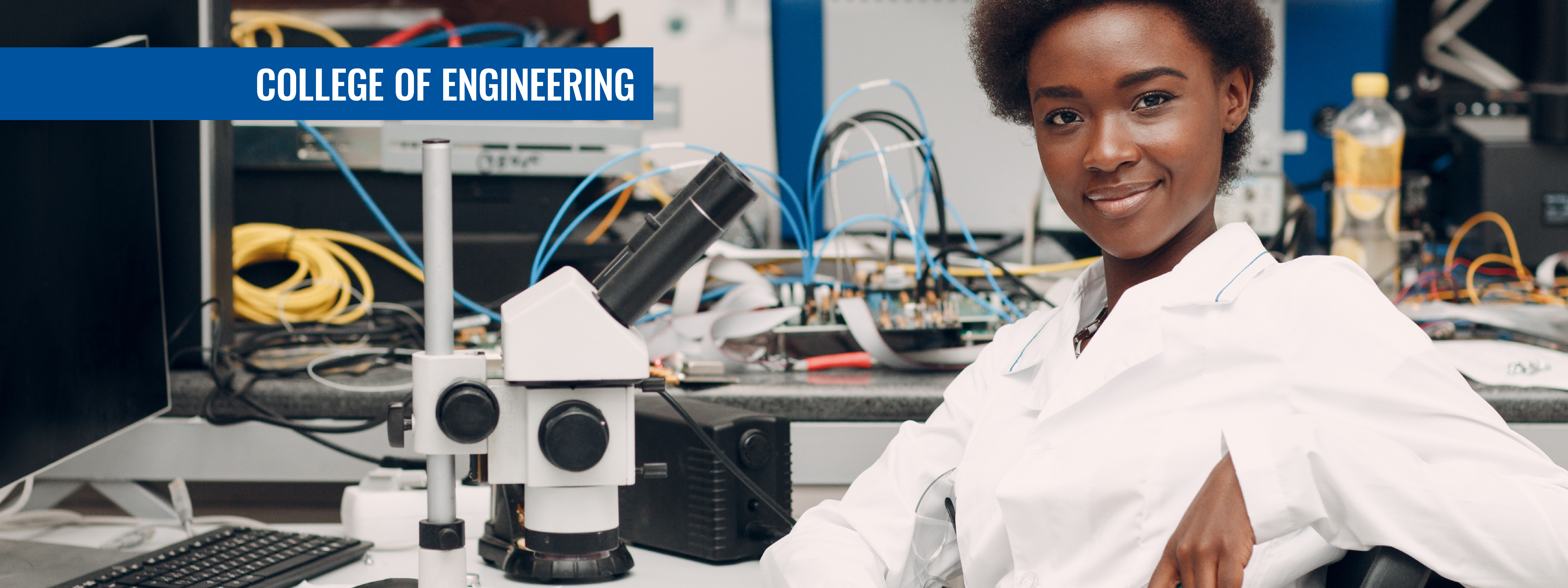- Home >
- College of Engineering
- > Engineering Core Courses
Engineering Core Courses
ENGR 1000, Engineering Orientation (1): This course is to provide all Engineering, Technology, and Computer Science students with information about the University policies, to assist them in adjusting to the University community, and to acquaint the students with the environment as an integral part of educational development.
ENGR 1001, ENGR 1011 Introduction to Engineering I and II (1-1): An overview of the College of Engineering, Technology and Computer Science, its academic support services, admission and retention standards, introduction to the engineering profession including engineering economics, probability and statistics, the programming and use of computers for word processing of technical report writing, spread sheets for data processing, and structured programming to aid scientific problem solving. Introduction to all departments including laboratory experiments. Completion of minor design project is required. Corequisite: MATH 1710
ENGR 1151 Computer Engineering Graphics and Analysis (1): A course is designed to develop the fundamental skills of graphics communication by manual and computer means. Sketching techniques to develop orthographic and pictorial graphics skills, standard technical drawing methods, dimensioning techniques, working drawings development skills, and lettering capability will be the fundamental focus of the course. Corequisite: ENGR 1001
ENGR 2010 Thermodynamics (4): An introduction to the nature and domain of thermodynamics; the Zeroth Law; properties and states of pure substances; work and heat; the First Law applied to both open and closed systems; general observations and statements of the Second Law; the inequality of Clausius and entropy changes for closed and open systems; vapor power and refrigeration cycles. Prerequisites: PHYS 2120, 2121, ENGR 2211 or 2221 or 2231
ENGR 2110 Statics (4): Statics of particles; statics of rigid bodies in three dimensions; centroids and centers of gravity; friction and moment of inertia. Prerequisites: MATH 1925, PHYS 2110, 2111, ENGR 1001
ENGR 2120 Dynamics (4): Study of the kinematics and kinematics of particles and rigid bodies; Principle of work and energy; Principle of impulse and momentum; Introduction to mechanical vibrations. Prerequisite: ENGR 2110 or 2130
ENGR 2250 Transport Phenomena (4): Unified treatment of the principles of thermodynamics, heat transfer and fluid mechanics. Energy Analysis and the first and second law of thermodynamics. Steady state and transient heat conduction, convection and the thermal radiation process. Fundamentals of fluid flow. Prerequisites: PHYS 2120, 2121, ENGR 2211 or 2221 or 2231
ENGR 3200 Introduction to Design (3): A course which considers the engineering design process as an interdisciplinary activity. Engineering Statistics, economic decision making and the design process are introduced as is oral and written technical reporting. A comprehensive design project is required as is a technical report and an oral report of the design. Prerequisites: ENGR 2000, ENGR 2010 or 2250, ENGR 2120, ENGR 2211 or 2221 or 2231
ENGR 3300 Materials Science (2): An introductory course on properties of materials, selection of materials, structure of crystalline and non-crystalline solids; mechanical behavior, electronics behavior, chemical behavior, stability and failure of materials Fundamentals of fluid flow. Prerequisites: CHEM 1110, PHYS 2120, 2121, ENGR 2211 or 2221 or 2231, MATH 1925
ENGR 3400 Numerical Analysis (3): Numerical solution of the system of linear and non-linear equations; numerical differentiation and integration; numerical solution of ordinary and partial differential equations; curve fitting; regression analysis and probability. Prerequisites: MATH 3120, ENGR 2211 or 2221 or 2231
ENGR 4201 Engineer in Training Laboratory (1): A course designed to prepare students for the Fundamentals of Engineering Examination, a partial requirement for obtaining license as a professional engineer. This courses is only offered during the fall semester. Prerequisite: Graduating Senior
ENGR 4500 Capstone Design Project I (1): An engineering capstone design project I leading to completion of the project in ENGR 4510. A written report and an oral defense of the proposed design project are required. Prerequisites: Graduating Senior, ENGR 3200
ENGR 4510 Capstone Design Project II (1): A continuation of capstone design project I leading to completion of the project. A written report and an oral defense of the project are required. Prerequisite: ENGR 4500
ENGR 4900 Professional Development Seminar (1): Discussion of case studies, professionalism, professional ethics, professional development activities required in industry. Prerequisite: Graduating Senior
webpage contact:
College of Engineering


